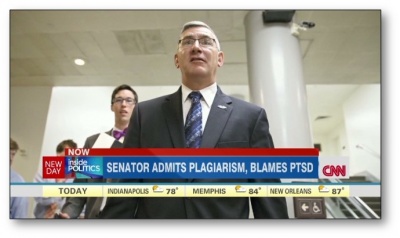John Walsh Thesis Revision
This page is an exercise in revising a massively plagiarized master's thesis by paraphrasing portions of the text that were either quoted without attribution (no citation) or quoted inappropriately (no quotation marks). In both cases we will re-write individual paragraphs and deposit the results here, by page number.
Here is a link to the New York Times article.
Instructions:
- Type on your personal notebook a piece of text (paragraph) from the page represented in the New York Times article of July 23, 2014.
- Edit to rephrase in your own words, avoiding close paraphrasing as much as possible.
- Cut and past results into this document on the proper page in the proper order, if possible.
- Do minor formatting or editing as needed.
- BONUS. If you are editing a passage without attribution, insert the reference.
Contents
Page 1
During George W. Bush's time as president, few believed that he would focus on the advancement of democracy. During 2001, the Bush administration did not even address the issue of promoting civil societies, rule of law, free elections and open political processes as major issues of their agenda. Early on, Bush and his team made it evident that they would not put heavy emphasis on fostering democracy, but rather they would focus on "great-power realism." In Bush's next term, he began by expressing that there would be a great focus on foreign policy through a large push toward achieving world peace. As a result, in early 2005, Bush released new policies which are now referred to as the Bush Doctrine. Though the policies were new, the foundation was not. The belief that bettering democracy outside of one's country to ensure safety within one's country is not a new idea. In his inaugural address on January 20, President George W. Bush declared that "it is the policy of the United States to seek and support the growth of democratic movements and institutions in every nation and culture, with the ultimate goal of ending tyranny in our world."
"As long as the Middle East remains a place where freedom does not flourish, it will remain a place of stagnation, resentment, and violence ready for export. And with the spread of weapons that can bring catastrophic harm to our country and to our friends, it would be reckless to accept the status quo. Therefore the United States has adopted a new policy, a forward strategy of freedom in the Middle East."
Establishing democracy in the Middle East, specifically in Iraq, is not a simple effort. There have been innumerable amounts of issues in America's attempt to help the region toward freedom.
"Those who believe that a democratic Middle East is possible are few in number. Within certain sectors of America, and nearly everywhere outside of America, the voices of skepticism are growing. Many have questioned whether the democratic world has a right to impose its values on a region that is said to reject them. Many have argued that military intervention in the Middle East is causing more harm than good."
Some also believe that due to the way things have been run
Page 2
This project will provide a valid argument that the United States must continue to pursue democracy in the Middle East as a key component of the National Security Strategy of the USA beyond January 20, 2009 when President Bush leaves office. Democracy is not a pure entity and the United States should not attempt to force democracy on other countries. (fn) The belief is that it is in the global interest for there to be more democratic countries. If the Bush doctrine is successful in laying the foundation for democracy in the region and elsewhere around the world, the spread of democracy in the Middle East will have to remain American policy beyond January 20, 2009. (fn) Patience is a must and if we have any hope of successfully promoting freedom as the alternative to tyranny and despair we must remain patient!
Defining Democracy
As the United States pursues democracy around the glove, it is important to understand the definition and concept of democracy. There are many disputes about the correct conceptual definition, about whether democracy is purely to elect leaders, about how we can calculate democracy, and the importance of the footwork for implementing democracy. (fn) Democracy is particularly challenging to define because it is not a physical substance, rather a form of rulership and an evolving form of governance(fn). There is a singular definition of democracy that is recognized in the US and much of the third world. As defined by the US State Department: "government by the people in whom the supreme power is vested in the people and exercised directly by them, or by their elected agents, under a free electoral system(fn).Representative Democracy is the most common, as it allows citizens to elect their representatives which indirectly gives power to the people in the government. In this day and age, the call for democracy is heard around the world. Totalitarian governments have been absent from Eastern Europe for almost half a century. The republics of the former Soviet Union are constantly trying, to replace the Communist regime of nearly seventy five years, with democracy. This is a system that they have never once before lived under. North and South America are currently the center of democracy. Democratic Reform is happening all throughout Africa, and many new democracies have laid groundwork for success in Asia.
Page 3
While acknowledging that the basic elements of a democracy will be different based on the cultural, economic, and social systems found in a given society leaves room for some imprecision in the application of the definition, a working definition of democracy that is largely accepted by political scientists who endorse what is known as the Democratic Peace Theory amounts to: 1. The nation must hold competitive elections. To be defined as competitive, there must be at least two formally independent political parties (or similar groups). 2. 50% or more of the adult population must be allowed to vote. 3. Those in legislative and executive power must have been put into place by said elections. 4. There must have been at least one peaceful, constitutional transfer of power between independent political parties. Nations which do not meet all four conditions might be considered emerging democracies or republics, but would not be considered democracies until they met all four conditions.
While this definition of democracy is fairly strict, most nations that are considered democracies fit these criterion. Most nations that are not usually considered democracies, especially middle eastern nations, do not meet all of these criterion, and therefore can be considered protodemocracies. There are also some nations, for example North Korea, who do not meet any of these criterion.
This definition will also allow us to easily tell the difference between democracy and liberal democracy, under a liberal democracy the vast majority of adults must be eligible to vote, and freedom of political speech and press must be enshrined in the system of law. Thus the United States, for example, would not have qualified for "liberal democracy" status until the 19th amendment was ratified to give women the right to vote and it didn't fully meet the promises of liberal democracy until it guaranteed the franchise to blacks some 40 years ago.
A fundamental part of democracy is the ability of the people to elect and remove their leaders. This democratic movement has spread and now many countries hold such elections.
Page 4
The Links between Democracy and Security
In 1994 the Clinton administration endorsed and adopted the idea that there is a link between democracy and security. [23] In his 1994 State of the Union address President Clinton declared that "ultimately the best strategy to insure our security and to build a durable peace is to support the advance of democacy elsewhere." [24] A year earlier, Anthony Lake, then President Clinton's assistant for national security affairs, had called for replacing the Cold War strategy of containment with a "strategy of enlargement - enlargement of the world's community of market democracies." [25]
President Bush throughout his presidency has also consistently argued that there is an inextricable link between freedom and peace, and between democracy and security.
The Bush administration and its defenders contend that the push for Arab democracy in the Middle East will not only spread American values but also improve U.S. security. As democracy grows in the Middle East, the thinking goes, the region will stop generating anti-American terrorism. Promoting democracy in the Middle East is therefore not merely consistent with U.S. security goals; it is necessary to achieve them. [26]
Studies have shown effectively no historical cases of war between democracies. In his article from 1983, Michael Doyle investigates a list of liberal states and compares this against all international wars between 1816 and 1980. [27] He determines that "constitutionally secure liberal states have yet to engage in war with one another." [28] Subsequent studies confirm this lack of war between democratic entities with statistically significant results that are not the result of random chance. [29] Investigating other possible confounders, such as geographical proximity and wealth, other analyses agree these other variables do not detract from the significance of concluding democracies rarely go to war with another democracy.[30]
Page 5
Par 1: The argument exists that spreading democracy is worthwhile for any country that attempts to do so. It is thought democracies are much less of a threat to other countries as they are less likely to launch a war against other democratic nations. In addition a democratic country is less likely to cause an influx of refugees, forcing other countries to deal with them. Due to these reasons, and also that democracies tend to be allies to one another, spreading democracy seems to be in the best interest of any country and therefore the United States as well.[1]
Par 2: To expand on the argument mentioned above, that spreading democracy results in less of a war threat, this idea is compelling because it suggests America would in turn experience a world containing fewer enemies. In such a world, both countries are able to enjoy more peaceful interaction and perhaps even cooperation as a result of decreased tensions. This reduction in threat level to the United States, would also by rule enhance the national security of the nation and allow for easier management of international relations. In addition, a world containing more democratic countries means an increase in support for the overall spread of democracy by nations other than the U.S. The typically problematic and authoritarian regimes include North Korea, Libya, Syria, Iran, and Sudan.[2]
Par 3:
- ↑ "Lynn-Jones, Sean M.. “Why the United States Should Spread Democracy.” Discussion Paper, 98-07, Belfer Center for Science and International Affairs, Harvard Kennedy School, March 1998."
- ↑ "Lynn-Jones, Sean M.. “Why the United States Should Spread Democracy.” Discussion Paper, 98-07, Belfer Center for Science and International Affairs, Harvard Kennedy School, March 1998."
Cite error: <ref> tag defined in <references> has no name attribute.
Cite error: <ref> tag defined in <references> has no name attribute.
Cite error: <ref> tag defined in <references> has no name attribute.
Cite error: <ref> tag defined in <references> has no name attribute.
Cite error: <ref> tag defined in <references> has no name attribute.

